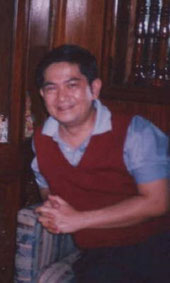General Psychology - Quiz III
A Short Quiz on Sensation, Perception and Learning
PART I - Items 1 - 10: MULTIPLE CHOICE - Choose the correct answer. Write the answer corresponding to the item number on your sheet of paper. Write the letter or text of the correct answer or both.
_____ 1. Which item does not belong to the group?:
A. yellow
B. black
C. green
D. blue
_____ 2. This principle states that people tend to fill in the gaps in an incomplete stimulus (object) so much so that they see a complete object. This principle is called:
A. principle of symmetry
B. principle of completion
C. principle of similarity
D. principle of closure
_____ 3. It is the readiness to respond in a certain manner to a stimulus or class of stimuli. It is called:
A. selective attention
B. perceptual constancy
C. set
D. none of the choices
_____ 4. In Pavlov's experiment, a dog was taught to salivate at the sound of a buzzer. This behavior is called:
A. conditioned stimulus
B. unconditioned stimulus
C. conditioned response
D. unconditioned response
_____ 5. It is the most important part of the eye. It is called the:
A. retina
B. lens
C. pupil
D. cornea
_____ 6. Which item does not belong to the group?:
A. smile
B. chocolate
C. money
D. praise
_____ 7. Located in the cochlea, this part of the ear is the true receptor for hearing. This is the:
A. oval window
B. organ of the corti
C. eardrum
D. round window
_____ 8. Which animals did Wolfgang Kohler use in his classic laboratory experiments on insight learning?:
A. chimpanzees
B. pigeons
C. cats
D. rats
_____ 9. The "theory of connectionism" is to Edward Thorndike as "____________________" is to Albert Bandura.
A. sign-learning theory
B. contiguous conditioning theory
C. frequency theory
D. social learning theory
_____10. The following eye deficiencies are due to defects of the lens except:
A. near-sightedness
B. astigmatism
C. presbyopia
D. far-sightedness
PART II - Items 11 - 15 : IDENTIFICATION - Each numbered item contains some words, description(s) or definition(s) related to concepts on sensation, perception and learning. IDENTIFY OR NAME the concept. Write the correct answer corresponding to the numbered item on your sheet of paper.
_______________11. Propioreceptors, muscles, tendons, joints, bodily movements, tabes dorsalis.
_______________12. In operant conditioning, it is the process of reinforcing a behavior based on the number of correct responses.
_______________13. These touch receptors are most sensitive to pain.
_______________14. It is a tool used to test a person's visual acuity.
_______________15. Thorndike's connectionism, Pavlov's classical conditioning, Skinner's instrumental learning.
ANSWERS TO A SHORT QUIZ ON SENSATION, PERCEPTION AND LEARNING
CORRECT ANSWERS
PART I - 10 POINTS
1. (B - black)
2. (D - principle of closure)
3. (C - set)
4. (C - conditioned response)
5. (A - retina)
6. (B - chocolate)
7. (B - organ of the corti)
8. (A - chimpanzees)
9. (D - social learning theory)
10. (B - astigmatism)
PART II - 5 POINTS
11. (kinesthesis or kinesthetic sense)
12. (ratio schedule)
13. (free-nerve endings)
14. (Snellen chart)
15. (stimulus-response theories or association theories of learning)
SCORING AND INTERPRETATION: NUMERICAL AND VERBAL DESCRIPTIONS
15 Points - Perfect
14 Points - Superior
12 - 13 Points - Very Satisfactory
11 - 10 Points - Good
9 Points And Below - The Process of Becoming, For Better or For Worse
REFERENCES
"General Psychology," 4th Edition, Birion, J., et. al., 1994
"Introduction to Psychology," 3rd Edition, Bustos, Alicia S., et. al., 1999
"Introduction to Psychology," 9th Edition, Atkinson, Rita L., et. al., 1987
RECOMMENDED STUDY
1. Name and describe the functions of three parts of each of our sense organs.
2. Cite one main difference between insight learning and the theory of connectionism.
 Hearts Philippines & Then Some
Hearts Philippines & Then Some




